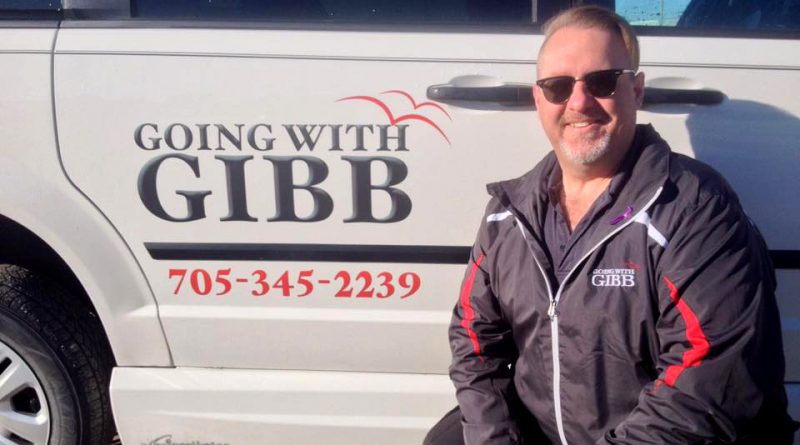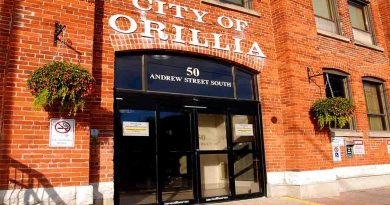Going My Way?
By John Swartz
Tuesday evening there is a public meeting at City Hall about the draft by-law to regulate and license vehicles for hire in Orillia. Some people aren’t happy with the updated by-law.
“Going With Gibb is an accompaniment service which features transportation, so I’m not happy being included with the taxi by-law because we are not a taxi,” said Brian Gibb.
The new by-law is trying to define and include services like his and others like Uber which previously didn’t specifically include them.
Everyone understands the concept of a taxi, you call, they come, you ride, and you pay. The problem is the old by-law definition of a taxi was so broad new services like Uber (although the argument Uber is like a taxi is not exaggerated) and other businesses Like Going With Gibb where part of the service involves picking up clients and taking them to places they need to go and returning them home can be interpreted to be taxis. The latter, according to Gibb is anything but a taxi.
“I service our clients before during and after and after their appointments with me,” said Gibb. His van has a wheelchair lift, tie-downs and safety equipment, and room for other support workers or family.
There are others with a similar service, Helping Hands, Happy at Home, R&R Patient Transfer, Because I Care, the Red Cross and their focus is on clients who can’t take care of themselves, or drive, but still need to get somewhere. Sheona Kloostra, of Happy At Home Support Services, says no one is calling for a ride and getting it ten minutes later with her service.
“I get a fax six weeks out that said please take client X with this medical condition, the requirements for this transportation are this, this and this; you must stay with the client from the time you pick them up to the time you take them back to their place of residence no matter where it is. They’re my client and I bill a month later,” Kloostra said.
There are taxis in Orillia that can take someone in a wheelchair, however, knowing their ride’s needs, and staying with them, or have the training to deal with mentally or physically infirm customers should something go wrong is not something anyone would expect a taxi driver to have or do. Gibb says his clients are hiring him and he needs his specially equipped van to do what he is hired to do, it’s a tool of his trade.
“Whether it’s cognitive or physical, they need my assistance; they need somebody with them, whether it’s me or somebody else,” Gibb said of the people he works with.
“We take unpredictable clients,” said Kloostra *. “Have you ever been in a car with someone who has had a seizure?”
Further complicating the matter is the by-law is trying to make a distinction between not-for-profits like Helping Hands and the Red Cross, with businesses like Going with Gibb and Happy at Home.
“Shawn (Crawford, manager of legislative services) has done his due diligence. He has interviewed almost every company, but they have this misgiving that not-for-profits fall into this different category,” said Kloostra.
“The issue is we’re not a taxi on demand. Neither of our services (Gibb, etc.) are on demand. In fact, Helping Hands needs 72 hours. You have to have a full intake, like me, like Brian, whether we are for-profit or not-for-profit we have the same policies and procedures. Mr. Crawford is aware of that,” she said.
The by-law lays out all manner of rules for companies to operate and drivers to go to work from age of vehicles (ten years, which means nothing to well maintained vehicles, or specialized vehicles like the kind Going with Gibb or R&R Patient Transportation have), to insurance (Happy at Home already carries $10 million, Going with Gibb $2 million), to how to maintain detailed records and business practices, and who can drive according to a spotless criminal record. In 2013 regulation of taxis changed from a police responsibility to a municipal one. At the April 16 council committee meeting where the draft by-law was presented, several councillors questioned why the City is even involved in licensing taxis.
“Does it make sense that we are in the business of regulating this business in the City of Orillia?” mayor Steve Clarke asked.
Councillors Tim Lauer and Ralph Cipolla also made similar comments, wondering why all the effort to regulate one specific type of business.
Indeed the bureaucratic thinking of, if we can regulated it we should, appears to inform many aspects of the by-law. Regarding background checks on drivers, the rational has a ‘think of the children’ argument in one paragraph. It’s hard to understand why that is when other businesses like Jack and Maddy A Kids Store or the former Toys R Us aren’t regulated in the same way.
The notion that insurance indemnifying the City is required when hundreds of other delivery services operating on Orillia roads each day aren’t required to have the same is just another cost to businesses. The same goes for vehicle safety requirements; Ontario already has regulations on vehicle safety and Kloostra makes the point that with all the competition there is now any business owner who doesn’t maintain their vehicles or hire properly won’t be in business for long.
Gibb believes the entire matter of regulating vehicles for hire by the municipality is not going to survive the June 18 council meeting when the by-law is introduced.
“We’re going to be pushing on Tuesday night for deregulation. I’ve talked to a couple different councillors and they seem to be in agreement with that,” Gibb said.
And if it does survive, the companies with services like Going With Gibb and Happy at Home aren’t going to lie down.
‘I’ve talked to Happy at home, Helping Hands, Stinson bus lines, R&R, if they go through with this there’s going to be some major fallout for the City” Gibb said.
The public meeting in the council chambers begins at 6 p.m.
(Photo Submitted) Brian Gibb says his service is not a taxi, nor a vehicle for hire and should not be regulated as such.
* This quote was misattributed to Brian Gibb.




